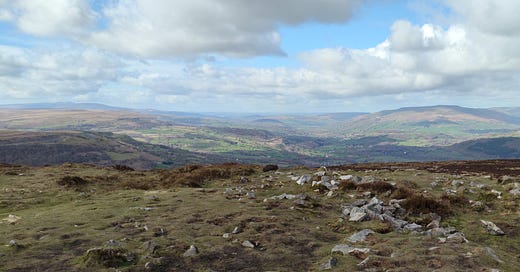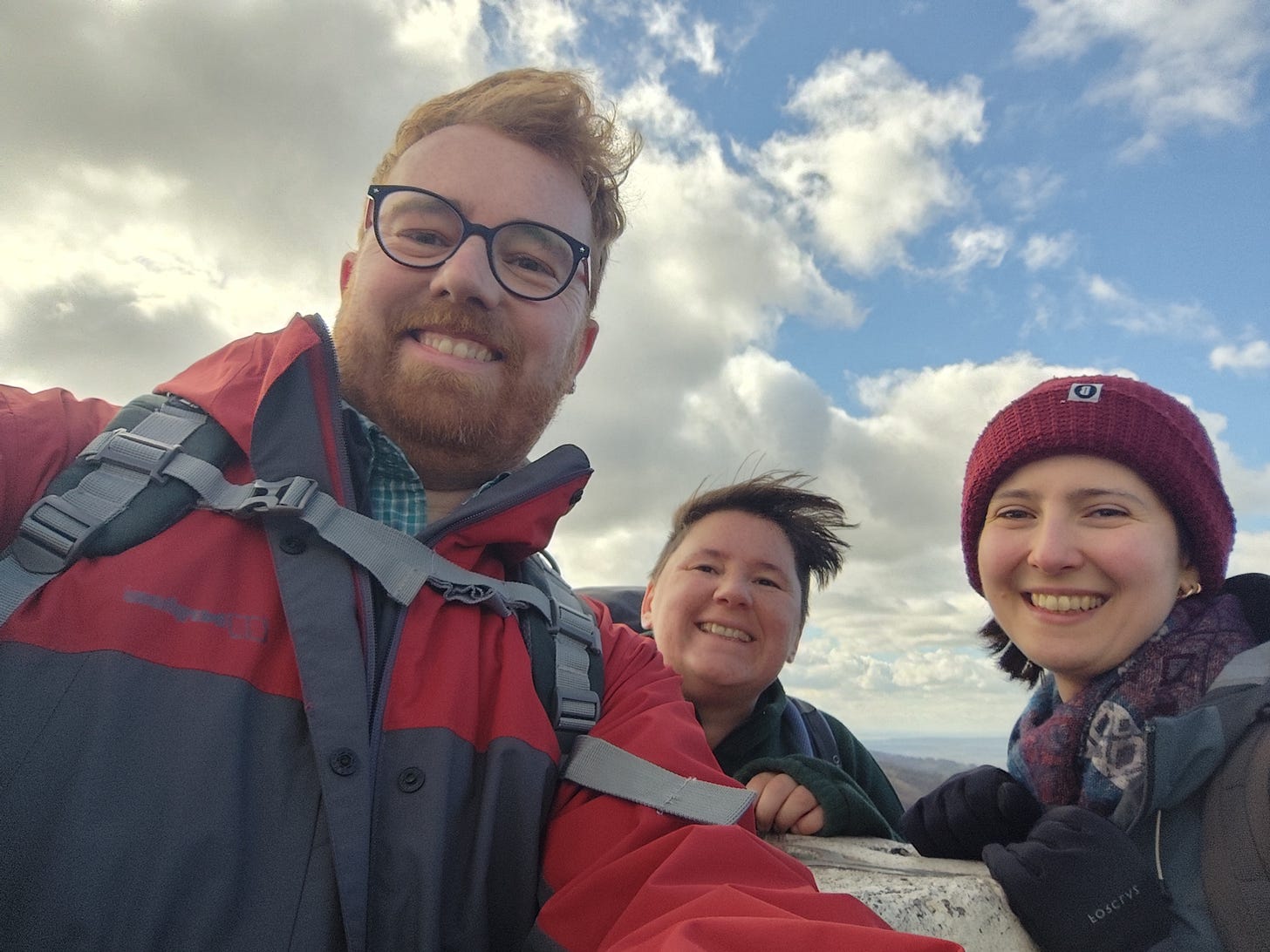“Look an insect on the number plate!” As my friends got their hiking gear out of the car Ludo noticed a small wriggling body against the white plastic of the number plate.
I wasn’t sure if I was going to write about our walk up Blorenge. Whenever I write I rely on finding the spark. Something lively and that tells me that I’m on the right track. When I thought about this walk I wasn’t sure I had the spark, and yet my mind kept going back to that moment when Ludo noticed an insect on the number plate.
The memory was slippery. I’d take my mind back to that moment and then my attention would slide off and go elsewhere.
Eventually I paid attention. I realised I had been afraid of being overwhelmed by grief for the planet. It was easier not to see than to feel the pain.
When I was a young child my Dad would wash scores of insects off the windscreen of the car, when it was parked in our driveway. When my Dad was a young man, on long drives to Scotland or down to Cornwall he’d have to pull the car over at least once to clear the windscreen of bugs. In his book ‘Moth Snowstorm’ Michael McCarthy describes being in the back of a car as a child. At night the headlights would illuminate the moths. Like a snow storm.
In the last twenty years insect numbers in the UK have declined by 60%[i]. A 2019 a report said numbers had fallen by 50% since 1970. 41% of insects globally are at risk of extinction.[ii]
I can understand these truths with my mind, but they are hard truths to let into my heart. When I really let them sink into me it stirs fear, both for the continued loss of all kinds of life and, more selfishly, worries about food security. What happens when there aren’t enough pollinators? What happens when there aren’t enough insects to create good soil? Thinking about this I can end up feeling angry and bewildered. It used to leave me with questions about what I could do. Now I’m not sure there is anything I can do.
In Dougal Hines book ‘At Work in the Ruins’ he quotes John Michael Greer on the difference between problems and predicaments. Problems have solutions. Predicaments do not. Mainstream society trains us to approach everything as if it’s a problem. The climate and ecological emergency is not a problem I can personally solve. It is a predicament and requires a different kind of response.
Our walk on Blorgence was just a few days after the spring equinox. The equinox was the excuse for the walk. We wanted to mark the changing year. Mikey suggested we bring some readings to share if we felt moved to. The week before the walk I cast around poetry books and websites trying to find something appropriate.
While I was searching for readings, I wasn’t consciously thinking of predicaments and the climate crisis. And yet in some ways each offered their own kind of answer.
As we walked down the single lane track from the car park there were huge tangles of thick tree roots growing from steep banks on either side of the road. They straightened up into beech trees and oaks still holding onto last year’s leaves. We stepped off the road and onto a public footpath that wound between fields. Along the path rocks and fallen logs were covered in moss of every shade of green. Beard lichen hung from the trees around us. Bursts of bright yellow caught our attention: buttercups and dandelions.
We paused on the footpath and I read out Veronica Patterson’s ‘A Charm Against the Language of Politics’.
She writes:
“Say over and over the names of things,
the clean nouns: weeping birch, bloodstone, tanager,”
And
“Remember that most short verbs are ethical: hatch, grow,
spin, trap, eat…”
Soon the footpaths gave way to open spaces and then the hill itself. A sea of dry brown bracken covered the hillside. In ‘Feral’ George Monbiot coined the term sheepwrecked for these spaces. Overgrazed hillsides with hardly any biodiversity.
This open landscape has its own kind of beauty. The lack of trees reveals the shape of the land, the hills of mudstones, limestones and sandstones, shaped by the slow flowing of glaciers long ago.
On the summit I read out Ren Powell’s ‘In Praise of the Trivial’. In it the un-named answerer of her questions suggests “Be Aware… Witnesss… Stay engaged in the world.” The speaker in the poem peels a mandarin and holds the rind to her nose, “and it is / too sweet to bear”
Back at the small car park, I see that the dead lamb I noticed in the field earlier has been taken away. Farming is a hard way to make a living. They are squeezed by more extreme weather, supermarkets paying them as little as possible and the cost of living crisis. The lambs in the field were so little and bright, “freshly unwrapped” said Mikey, full of joy.
There at the end of the walk, I read Galway Kinnell’s ‘St Francis and the Sow’ in which he teaches us that “everything flowers, from within, of self-blessing”
When I root myself in the words of these three poets, the waves of climate grief are easier to face, and a way forward opens up to me. I am invited to continue to walk, to continue to feel my feet on the ancient Earth, one step at at time and to trust in something beyond solutions to problems.
[i] A bugs against number plates study: https://www.nhm.ac.uk/discover/news/2022/may/uks-flying-insects-have-declined-60-in-20-years.html







Kaspa! Wonderful writing, especially the bit featured in ReVerse. And I relate exactly to what you say. Thank you.
A rich post! (I'm so happy to be included. Thank you for bringing my words to the Welsh countryside. I've a private joy in knowing this.) Oh, the insects! Yes. I noticed when I returned to the desert after decades of being away: the loss of life we've taken for granted is a real grief. And thank you for the link to Patterson's poem!